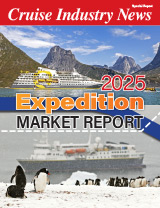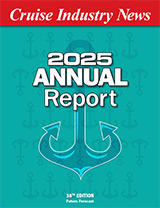Marine operations, safety and newbuilding programs were focus topics on the final day of Passenger Ship Safety Southampton, rounding out a unique conference program with speakers from Carnival Corporation, Saga Cruises and various industry suppliers.
One ambitious project under way has been man overboard detection. Several systems have been installed and tested, according to Mike Collier, research and project manager for Carnival. He noted there were no regulations in place for the systems yet, however, and that the project was still in an early phase.
The main challenge is finding a reliable technology, whether it be radar, lidar or thermal, with testing under way on a combination of all three. Video analysis has been ruled out.
Among the problems are false positives and weather interfering with the systems. Furthermore, the technology has to be linked to ECDIS (Electronic Chart Display and Information System ) to come up with the ship’s position at the time of an alarm.
Lifeboat accidents still remain an occurring problem in the industry, usually attributed to davit issues.
The UK MAIB attributes most incidents to over-complicated systems for lifeboat launching, leading to human error, saidDirk van Aarsen, head of safety and occupational health for Carnival Maritime.
Thus, a new solution includes automatic controls of davit points as a kind of electronic check-list, presenting the operator with a green light for safe launching. Pilot projects are installed on both the AIDAprima and new Majestic Princess, and van Aarsen said retrofits would be relatively simple.
Saga Cruises will take delivery of its first-ever newbuild in summer 2019, according to James Langley, vice president of marine operations for the British brand. He said the newbuild is a way for the company to move on from older vessels that bring technical and regulatory challenges. “We want a new ship, which means there are no excuses,” he said.
Safety planning onboard has been driven by the company’s passenger demographic (over 50), taking into account evacuation flows, life saving equipment, gangways, stairs and the elevators.
The company is already preparing its training program for the new ship, including safety assessment and the modern facilities the ship will have, such as the move to pods from traditional propulsion.
Modern life-saving appliances were a topic for Francesco Casarini, director of marine and safety for newbuildings at Carnival Corporate Shipbuilding.
He said lifeboats had gotten bigger, and there were projects in place to continue to increase lifeboat capacity, which brings into question the time allowed for embarking and launching.
With regulatory changes, he said the best lifeboat is now the vessel itself, with new Safe Return to Port regulations in addition to damage stability requirements.
SOLAS is somewhat flexible on evacuation methods, as long as other methods bring an equivalent level of safety. In designing life-saving appliances for newbuilds, he said it was close to impossible to work with one view. “Studies have to be carried out by ship by ship, even when they are sister ships,” he said.
Alternative fuels were another hot topic at Passenger Ship Safety, with Yves Bui, LNG Project Director for MSC Cruises, highlighting the company’s LNG bunkering system development plans for upcoming newbuilds.
Espen Kristiansen, vice president of business solutions at PEBS, discussed the potential of battery power in large-scale marine applications, which at this point are targeted at shorter routes.
As battery technology evolves, this could change, however. Hurtigruten is among the first cruise lines to commit to battery power and will be able to sail for short periods on batteries on their two new ships, set for delivery in 2018 and 2019, respectively.
Other presentations and topics included maintenance of high-pressure water mist nozzles, by industry specialist Ultra-Fog which supplies the nozzles, training and tools for the job.
In addition was a presentation from class society Lloyd’s Register on fuel compliance in regards to upcoming Emissions Control Area regulations.
The next Passenger Ship Safety event takes place in Florida in January 2018, stay tuned for details.



